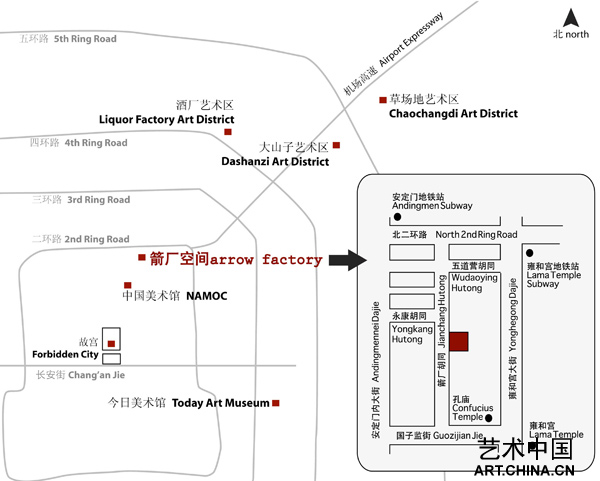
大家庭:是兄弟,不是同志
林一林藝術(shù)計(jì)劃,蔡青、蔡偉和方璐作品共同展出
2009年6月15日-2009年8月9日
《大家庭:是兄弟,不是同志》,是一個(gè)從看似無(wú)關(guān)緊要的立場(chǎng)出發(fā)來(lái)講述所謂重大事件,進(jìn)而探討集體與個(gè)人經(jīng)歷之間動(dòng)態(tài)變化的項(xiàng)目。林一林一改“歷史”作為重大事件、地點(diǎn)和個(gè)體編年史的標(biāo)準(zhǔn)敘事手法,《大家庭:是兄弟,不是同志》這件新作呈現(xiàn)了與平凡、隨意和個(gè)人密切相關(guān)的紀(jì)錄。作品試圖將附帶事件置于核心舞臺(tái),進(jìn)而削弱書面歷史的主導(dǎo)方針,把玩我們用以將重要事件從不相干事件中區(qū)分出來(lái)的方式。
由于采用了宏大的歷史年表的風(fēng)格特征,《大家庭:是兄弟,不是同志》運(yùn)用錄像、攝影和文本,來(lái)標(biāo)記海外華人藝術(shù)家這一特定群體中的活動(dòng)和事件——可以說(shuō),這是一個(gè)分布在不同國(guó)家和大陸的家庭—他們通過(guò)1990年代走出國(guó)門這一共同經(jīng)歷而聯(lián)系起來(lái)。其中一些藝術(shù)家非常有名,另一些名不見經(jīng)傳;有人橫貫歐洲,而有些則前往美國(guó)。一些人功成名就、時(shí)來(lái)運(yùn)轉(zhuǎn),而另一些則貧病交加、郁郁而終。然而,從某些方面來(lái)講,他們的生活不經(jīng)意間同有意或無(wú)意地離開中國(guó)后的邊緣生活所導(dǎo)致的事件和經(jīng)歷相聯(lián)系。描繪這些偶然經(jīng)歷如何發(fā)生,如何彼此重合,如何同毛主席、卡爾·馬克思以及弗里德里希·恩格斯這些著名政治人物相重疊,重點(diǎn)強(qiáng)調(diào)了這些個(gè)別經(jīng)歷和軌跡的隨機(jī)性和不重要的特征。就像之前在箭廠空間的其它藝術(shù)項(xiàng)目一樣,《大家庭:是兄弟,不是同志》也考慮到其周邊環(huán)境和背景語(yǔ)境,在這種情況下,微渺的個(gè)體當(dāng)中所發(fā)生的一系列瑣碎事件被有意呈現(xiàn)在一個(gè)邊緣空間中,喚起我們對(duì)于為不同遭遇和經(jīng)歷賦予不同的“重要”程度時(shí)我們自身偏見和判斷的關(guān)注。年表一直延續(xù)至今,箭廠空間和藝術(shù)家為此將在六月十四日周日下午四時(shí)至六時(shí)舉辦一次特別的非正式活動(dòng),在紀(jì)念《大家庭:是兄弟,不是同志》的同時(shí)也將這些歷史經(jīng)歷在北京一條不起眼的胡同中進(jìn)行延續(xù)。
“箭廠空間”是一個(gè)由獨(dú)立策展人和藝術(shù)家組織策劃的藝術(shù)櫥窗項(xiàng)目。空間位于北京市中心的胡同里,原本是個(gè)小商鋪,經(jīng)過(guò)改造后擁有10平方米的展出面積。“箭廠空間”首先希望通過(guò)櫥窗這種特殊的展示方式,為藝術(shù)家的創(chuàng)作方法提供一種新的可能,空間內(nèi)定期更新的藝術(shù)作品將會(huì)在這里每天面對(duì)不同的社會(huì)群體和文化情境。其次項(xiàng)目自身也試圖探討藝術(shù)與日常生活之間的美學(xué)關(guān)系,嘗試藝術(shù)創(chuàng)作與公共空間的有機(jī)對(duì)話,促進(jìn)當(dāng)代藝術(shù)的試驗(yàn),交流與研究。“箭廠空間”將會(huì)積極地邀請(qǐng)國(guó)內(nèi)和國(guó)外的藝術(shù)家提供現(xiàn)場(chǎng)裝置和項(xiàng)目。
Big Family: Brothers, Not Comrades
A project by Lin Yilin, with works by Cai Qing, Cai Wei and Fang Lu
June 15 – August 9, 2009
Please join us for a special event on Sunday, June 14, 4-6pm
Big Family: Brothers, Not Comrades, is a project that explores the dynamic between collective and personal histories through the telling of so-called important events from the perspective of the seemingly insignificant. Inverting the standard narration of 'History' as a chronicle of major events, places and individuals, Lin Yilin's new work, Big Family: Brothers, Not Comrades, presents a record that relates to the mundane, arbitrary and personal. The work attempts to undermine dominant strategies of writing history by putting sidelined events into center stage, playing with the ways we distinguish the important from the irrelevant.
Adopting the stylistic hallmarks of a grand historical timeline, Big Family: Brothers, Not Comrades uses video, photographs and text to chart the events and episodes amongst a specific group of overseas Chinese artists—a family so to speak, spread across different countries and continents—that are united by their joint experiences in migrating from China during the 1990s. Some of the artists mentioned are famous, some are lesser known; some traversed Europe and some went to America, some encountered fame and fortune while others fell ill and died. Yet their lives are all in some way linked by chance episodes and experiences that result from a life in the margins after voluntary or involuntary exile from China. Tracing how these random histories coincide and overlap with one another and with preeminent political figures such as Chairman Mao, Karl Marx and Friedrich Engels, underscores the random and nonessential roles of these individual histories and locations. As in previous Arrow Factory projects, Big Family: Brothers, Not Comrades is ever mindful of its surrounding environment and context. In this case a set of trivial events occurring amongst minor individuals are purposely presented in a marginal space, calling attention to our own bias and judgment in attaching scales of ‘importance’ to various encounters and experiences. Continuing the timeline up to the present, Arrow Factory and the artist will hold a special informal event on Sunday, June 14 from 4-6pm to commemorate Big Family: Brothers, Not Comrades and to realize the ability for these histories to leave their mark on such far-flung places as an inconsequential hutong alley in Beijing.
Arrow Factory is an independently run alternative storefront space that seeks to advance artistic collaboration, exploration and experimentation across different cultural contexts and viewing publics. Located in a small hutong in Beijing’s city center, Arrow Factory reclaims existing commercial space to present artworks that stimulate dialogue between art and contemporary urban space. Aimed at reaching a diverse public made up of local residents, as well as local and international art audiences, our modestly sized space (approx 10 square meters or 100 square feet) is intended to create new avenues for artistic production in China and further aesthetic relationships between contemporary art and everyday life. Arrow Factory will invite artists living inside and outside of China to create site-specific installations and projects that will be available for view in its storefront location 7 days a week.
箭廠空間
箭廠胡同38號(hào) (國(guó)子監(jiān)街內(nèi))
北京 100007 中國(guó)
Arrow Factory
38 Jianchang Hutong (off Guozijian Jie)
Beijing, 100007 China
www.arrowfactory.org.cn
arrowfactory@gmail.com
